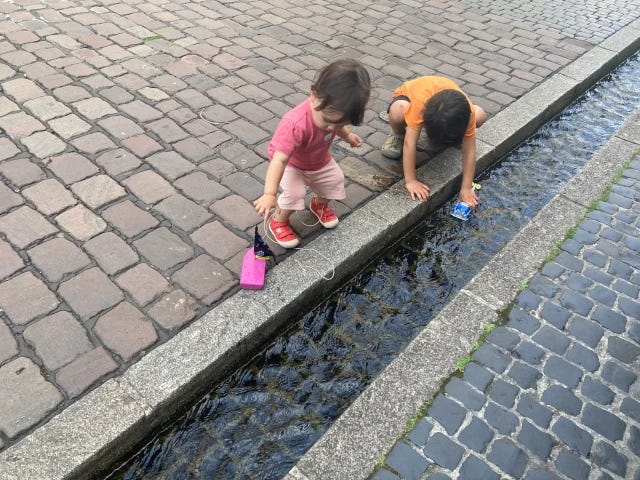Last Friday, my husband and I attended his friend’s wedding without our kids. It was our first time partying without them since my eldest was born, and he’s five now! It felt like stepping into an almost forgotten dream as I swirled on the dance floor with him. It was almost surreal, a beautiful reminder of a life we once had.
****
I can’t help but wonder—will life always be like this? The eternal longing for the sweetness and the continuous grieving for the sadness of the past? Will the feeling of nostalgia, melancholy, and bittersweetness always take us in whenever we pause enough to think about life? Every different stage of life is tinged with its unique sense of longing.
Just like now, I miss our spontaneous lives before the kids, when we could decide on a whim what we wanted to do. And just like in those times, I missed the unplanned backpacking and traveling days filled only with exploration and adventures. And just like in those times, I missed my single days, spending all my time with friends and indulging in whatever my heart desired without the need to accommodate anyone. Just like in those times, I missed my carefree university days, spending our non-exam days filled with leisure. And just like in those times, I missed my unburdened childhood days, when my curiosity was filled with discovering and reading books and dreaming about all the possibilities of life. Just like in those times, I missed my secure and happy days, playing endlessly with my god-siblings at my Lai Ma and Lai Pa - my nanny and her husband. And those were the times I missed the most and had missed the longest in my life ever since I had the capacity to miss anything.
I can’t help but wonder, too—besides longing for the past, do we not also spend a lot of time anticipating the future? Like in my childhood, I used to wonder when I would grow up and finally decide what to do myself. When would I get to earn my own money? When would I achieve financial freedom? When would I meet the love of my life? When would we have kids? When would the kids become independent and leave? When would I retire for real? And, of course, most importantly, when will I die? This final question punctuates all thoughts of the future and is the only one we know the answer to for sure.
How can one then live in the now with all these longings for the past and anticipations of the future? It can be challenging to enjoy the ephemeral moments, immerse in the fleeting joy, and be content with the current phase of life, which changes swiftly and suddenly. Would we even have memories of anything with this constant battle of our minds?
When we embrace conscious living, we can learn to bring ourselves back to the present again and again to appreciate the now. One way to anchor ourselves in the moment and to ensure our lives are filled with memories is to use the power of rituals.
As I go through those memories, I realize how precious and few they are. It dawned on me how rituals could help create memories. We need to do something repeatedly and often enough that it will become one memory in the future. I have many of these “one memory” representing a collection of memories, essentially doing the same thing or for the same reason. Some may be significant events, and some may be from the simple routine of life.
Like the memory of rolling tong yuen with Ah Ma and my cousins and placing my malformed ones onto the dulang - a large tray. And like the memory of helping Ah Ma fold paper money for days and watching her burn them all afterwards. Like the memory of waking up on the first day of Chinese New Year to dress in stifling new clothes and rushing over next door to Ah Ma to receive Ang Pows - red packets stuffed with money. Like the memory of cycling around my housing area endlessly and washing my parent’s car to earn 20 ringgit on weekends. Like the memory of swallowing a smelly, barely cooked egg in the morning with my nose pinched before heading to school.
“With ritual, we can both keep time and keep up with time.” - Brad Shore1
But what is ritual? Psychological anthropologist Brad Shore says, “We can think of rituals as routines with a significant symbolic load.”
Of course, we also have memories of things that are sudden, strange or have significant meaning and impact. Those are few but no less important, but they are mostly not something we can plan or something that only happens once in our lives, like birth, travel, marriage, or death.
For rituals, on the other hand, we can decide on it and carry it out religiously, whether daily, yearly, or even once a decade. These rituals will form the backbone of the story we use to narrate our lives. Who are we but the stories we tell of ourselves? Take away our story, you take away, well, us. You take away our existence.
I grieve sometimes, especially after a day of making meaningful memories, knowing that my young children will never remember these moments. They will not have memories of their early childhood. Not really. But there will be some remnants, at least for me there are, and they are, I bet, a repetition of the same thing that I constructed as one—a memory of a ritual.

So, what rituals would I like to have and keep in my life? What rituals do I want to give my children? What memories do I want to have to tell my life stories and for my children to tell theirs?
We are already continuing traditions from our ancestors to celebrate Chinese New Year and Christmas, ensuring significant rituals are performed along with them. Interestingly, I see parallel similarities to both of these two celebrations.
For the Chinese New Year in Malaysia, the most important celebration is the one on the eve known as Nin Saa Maan. Similarly, in Germany, the most important celebration of Christmas is also on its eve, Heiligabend - the holy evening. In both celebrations, families gather together to enjoy a big, lovingly prepared meal and to catch up on the year. While the Chinese gather to usher in a prosperous new year, the German celebrates the birth of Jesus Christ. After that, the most anticipated rituals for all children will occur- the Christmas gift-giving and the Ang Pow-giving.
Though not all rituals have to be for a specific celebration or reason, some rituals can be personal only for the family or individual. My personal favorite ritual is making a pot of tea every evening after tucking the children in bed and enjoying the warmth of the tea to unwind and settle in for the night. One other ritual we have for the family is pancakes for Sunday breakfast! Though we don’t do that as consistently as every Sunday, it is often enough to make itself into something the children jump with joy. Depending on who is with the first child that woke, they start making pancakes together until the rest of the family rises. It’s a wonderful, slow ritual to start Sunday together with the house filled with the smell of pancakes.
****
As I sway to the music in my husband’s embrace, I smile at the thought of all the big and little rituals we perform at home with our children. I hope these rituals will create a tapestry of warm memories for them to remember their childhood by. And maybe, after they have grown up, they will continue with some of our rituals and perhaps create some of their own to carry forward the warmth and love we’ve shared. For now, I will cherish our multicultural celebrations and simple personal rituals, knowing that these memories will carry on long after the music has faded.
Share with us!
What rituals do you have that will form memories to tell the stories of your life?






I think your Sunday pancake ritual sounds wonderful and yummy! Rituals are important and sound so much better than routine, which, you could argue is the same thing in this context. But I love the idea of the intention making the difference, the infusion of something sacred happening.
This is so beautiful, Rachel. There are so many thing in there I can relate to. I have a two year old kid and there are sentences there that seem to have been from my life. And the connections between rituals and memory and memories. I will savour this for long.